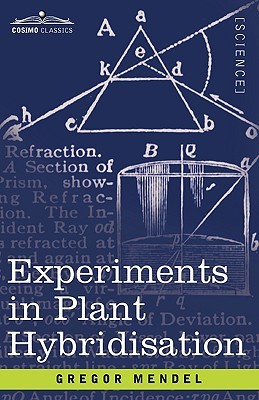
- We will send in 10–14 business days.
- Author: Gregor Mendel
- Publisher: Cosimo Classics
- ISBN-10: 1605202576
- ISBN-13: 9781605202570
- Format: 14.3 x 21.7 x 0.4 cm, softcover
- Language: English
- SAVE -10% with code: EXTRA
Reviews
Description
Experiments which in previous years were made with ornamental plants have already afforded evidence that the hybrids, as a rule, are not exactly intermediate between the parental species. With some of the more striking characters, those, for instance, which relate to the form and size of the leaves, the pubescence of the several parts, etc., the intermediate, indeed, is nearly always to be seen; in other cases, however, one of the two parental characters is so preponderant that it is difficult, or quite impossible, to detect the other in the hybrid. --from "4. The Forms of the Hybrid" One of the most influential and important scientific works ever written, the 1865 paper "Experiments in Plant Hybridisation" was all but ignored in its day, and its author, Austrian priest and scientist GREGOR JOHANN MENDEL (1822-1884), died before seeing the dramatic long-term impact of his work, which was rediscovered at the turn of the 20th century and is now considered foundational to modern genetics. A simple, eloquent description of his 1856-1863 study of the inheritance of traits in pea plants--Mendel analyzed 29,000 of them--this is essential reading for biology students and readers of science history. Cosimo presents this compact edition from the 1909 translation by British geneticist WILLIAM BATESON (1861-1926).
- Author: Gregor Mendel
- Publisher: Cosimo Classics
- ISBN-10: 1605202576
- ISBN-13: 9781605202570
- Format: 14.3 x 21.7 x 0.4 cm, softcover
- Language: English English
Experiments which in previous years were made with ornamental plants have already afforded evidence that the hybrids, as a rule, are not exactly intermediate between the parental species. With some of the more striking characters, those, for instance, which relate to the form and size of the leaves, the pubescence of the several parts, etc., the intermediate, indeed, is nearly always to be seen; in other cases, however, one of the two parental characters is so preponderant that it is difficult, or quite impossible, to detect the other in the hybrid. --from "4. The Forms of the Hybrid" One of the most influential and important scientific works ever written, the 1865 paper "Experiments in Plant Hybridisation" was all but ignored in its day, and its author, Austrian priest and scientist GREGOR JOHANN MENDEL (1822-1884), died before seeing the dramatic long-term impact of his work, which was rediscovered at the turn of the 20th century and is now considered foundational to modern genetics. A simple, eloquent description of his 1856-1863 study of the inheritance of traits in pea plants--Mendel analyzed 29,000 of them--this is essential reading for biology students and readers of science history. Cosimo presents this compact edition from the 1909 translation by British geneticist WILLIAM BATESON (1861-1926).


Reviews